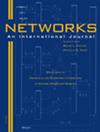Algorithmic solutions for maximizing shareable costs
IF 1.3
4区 计算机科学
Q4 COMPUTER SCIENCE, HARDWARE & ARCHITECTURE
引用次数: 0
Abstract
This article addresses the linear optimization problem to maximize the total costs that can be shared among a group of agents, while maintaining stability in the sense of the core constraints of a cooperative transferable utility game, or TU game. When maximizing total shareable costs, the cost shares must satisfy all constraints that define the core of a TU game, except for being budget balanced. The article first gives a fairly complete picture of the computational complexity of this optimization problem, its relation to optimization over the core itself, and its equivalence to other, minimal core relaxations that have been proposed earlier. We then address minimum cost spanning tree (MST) games as an example for a class of cost sharing games with non‐empty core. While submodular cost functions yield efficient algorithms to maximize shareable costs, MST games have cost functions that are subadditive, but generally not submodular. Nevertheless, it is well known that cost shares in the core of MST games can be found efficiently. In contrast, we show that the maximization of shareable costs is ‐hard for MST games and derive a 2‐approximation algorithm. Our work opens several directions for future research.可分担成本最大化的算法解决方案
本文探讨了一个线性优化问题,即在保持合作可转移效用博弈(或称 TU 博弈)核心约束条件稳定性的同时,最大化一组代理之间可分担的总成本。在最大化可分担的总成本时,成本分担必须满足定义 TU 博弈核心的所有约束条件,预算平衡除外。文章首先相当全面地介绍了这一优化问题的计算复杂性、它与核心本身优化的关系,以及它与早先提出的其他最小核心松弛的等价性。然后,我们以最小成本生成树(MST)博弈为例,讨论了一类具有非空核心的成本分摊博弈。亚模态成本函数产生了最大化可分摊成本的高效算法,而 MST 博弈的成本函数是亚正数,但一般不是亚模态的。尽管如此,众所周知,MST博弈核心中的成本份额可以高效地找到。与此相反,我们证明了 MST 博弈的可分担成本最大化是很难的,并推导出了一种 2 近似算法。我们的工作为未来研究开辟了几个方向。
本文章由计算机程序翻译,如有差异,请以英文原文为准。
求助全文
约1分钟内获得全文
求助全文
来源期刊

Networks
工程技术-计算机:硬件
CiteScore
4.40
自引率
9.50%
发文量
46
审稿时长
12 months
期刊介绍:
Network problems are pervasive in our modern technological society, as witnessed by our reliance on physical networks that provide power, communication, and transportation. As well, a number of processes can be modeled using logical networks, as in the scheduling of interdependent tasks, the dating of archaeological artifacts, or the compilation of subroutines comprising a large computer program. Networks provide a common framework for posing and studying problems that often have wider applicability than their originating context.
The goal of this journal is to provide a central forum for the distribution of timely information about network problems, their design and mathematical analysis, as well as efficient algorithms for carrying out optimization on networks. The nonstandard modeling of diverse processes using networks and network concepts is also of interest. Consequently, the disciplines that are useful in studying networks are varied, including applied mathematics, operations research, computer science, discrete mathematics, and economics.
Networks publishes material on the analytic modeling of problems using networks, the mathematical analysis of network problems, the design of computationally efficient network algorithms, and innovative case studies of successful network applications. We do not typically publish works that fall in the realm of pure graph theory (without significant algorithmic and modeling contributions) or papers that deal with engineering aspects of network design. Since the audience for this journal is then necessarily broad, articles that impact multiple application areas or that creatively use new or existing methodologies are especially appropriate. We seek to publish original, well-written research papers that make a substantive contribution to the knowledge base. In addition, tutorial and survey articles are welcomed. All manuscripts are carefully refereed.
 求助内容:
求助内容: 应助结果提醒方式:
应助结果提醒方式:


